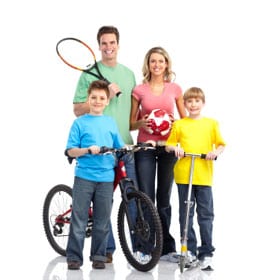Adults and Children
Proficiency is of paramount importance when promoting athletic performance in children and adolescents. The adolescence years are appealing in the areas of sport and independent behavior during this significant phase of the lifespan. The arena of the cognitive development and the psychosocial development during the adolescence years are an intriguing prospect. Throughout childhood and adolescence, physical activity is surrounded by the many environmental aspects indispensable to achieve full potential for growth and development. The pressure to participate in the sporting world may be immense for adolescent youth. Trust and empathy skills are needed as it takes a special individual to communicate, articulate and invigorate youth for performance in many arenas including sport. Children and adolescents tend to model themselves after adults or perceived adult sport heroes. Patience while working with youth is a highly sought after skill that comes with the territory. A child may have significant struggles with mood, anxiety or the fear of not fitting in. Comprehension of diversity for leaders of children and adolescents may play an important role during the period of growth and development. Socioeconomic, cultural and gender concerns are skills that one must be aware of.
Children may be vulnerable to what they see, hear and act out while emulating an adult. Adolescents may have too much too soon or have the moniker of the next great athlete or the best in the country. Acceptance from peers or jealousy may come in to existence for the age group. Injury also may be vulnerability as some adults push a child’s young body to the maximum and this may cause burnout in the sporting world. The adult athlete may base performance just on staying in shape and not trying to model after other athletes. Impairments that are common in children and adolescents are fear and shyness and the ability to let others know, that they really do not want to participate in the sporting world. The areas of exploration that VRC would like to examine in the capacity of working with the age group during group sessions consist of:
Social and Awareness Skills
Coaching
Goal Setting
Anxiety
Relaxation
Coping Skills, Confidence & Motivation
Let Them Have Fun

